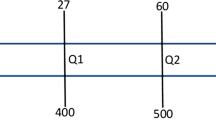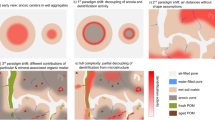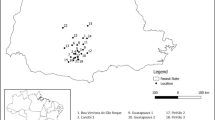Abstract
Nitrification and denitrification are, like all biological processes, influenced by temperature. We investigated temperature effects on N trace gas turnover by nitrification and denitrification in two soils under two experimental conditions. In the first approach ("temperature shift experiment") soil samples were preincubated at 25 °C and then exposed to gradually increasing temperatures (starting at 4 °C and finishing at 40–45 °C). Under these conditions the immediate effect of temperature change was assessed. In the second approach ("discrete temperature experiment") the soil samples were preincubated at different temperatures (4–35 °C) for 5 days and then tested at the same temperatures. The different experimental conditions affected the results of the study. In the temperature shift experiment the NO release increased steadily with increasing temperature in both soils. In the discrete temperature experiment, however, the production rates of NO and N2O showed a minimum at intermediate temperatures (13–25 °C). In one of the soils (soil B9), the percent contribution of nitrification to NO production in the discrete temperature experiment reached a maximum (>95% contribution) at 25 °C. In the temperature shift experiment nitrification was always the dominant process for NO release and showed no systematic temperature dependency. In the second soil (soil B14), the percent contribution of nitrification to NO release decreased from 50 to 10% as the temperature was increased from 4 °C to 45 °C, but no differences were evident in the discrete temperature experiment. The N2O production rates were measured in the discrete temperature experiment only. The contribution of nitrification to N2O production in soil B9 was considerably higher at 25–35 °C (60–80% contribution) than at 4–13 °C (15–20% contribution). In soil B14 the contribution of nitrification to N2O production was lowest at 4 °C. The effects of temperature on N trace gas turnover differed between the two soils and incubation conditions. The experimental set-up allowed us to distinguish between immediate effects of short-term changes in temperature on the process rates, and longer-term effects by which preincubation at a particular temperature presumably resulted in the adaptation of the soil microorganisms to this temperature. Both types of effects were important in regulating the release of NO and N2O from soil.
Similar content being viewed by others
Author information
Authors and Affiliations
Additional information
Received: 20 October 1998
Rights and permissions
About this article
Cite this article
Gödde, M., Conrad, R. Immediate and adaptational temperature effects on nitric oxide production and nitrous oxide release from nitrification and denitrification in two soils. Biol Fertil Soils 30, 33–40 (1999). https://doi.org/10.1007/s003740050584
Issue Date:
DOI: https://doi.org/10.1007/s003740050584




